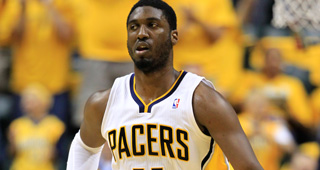Roy Hibbert is one of the more entertaining players in the NBA and has become a must-follow on Twitter. He uses social media to hold court on a variety of topics, including the benefit of long arms when taking a selfie, George Orwell’s Animal Farm and Playstation 4.
He is also regarded as one of the most thoughtful and engaging players in the league, which is why RealGM recently spoke with him about the importance of education and the use of common sense as a professional athlete.
Hibbert, who was born in Queens, spent his teenage years at Georgetown Preparatory School in Maryland before earning his degree in government studies at Georgetown. While he eventually pulled his name from consideration and returned for a fourth year, Hibbert briefly flirted with leaving school early for the 2007 NBA Draft.
“Once I decided to go [back to school] after I put my name in the draft following my junior year, I realized I wouldn’t have finished if I left school. It was too hard,” Hibbert told RealGM. "I decided to stay and I got my degree, but I know there are plenty of guys who go to school for four years and still don’t get their degree.”
An only child, Hibbert was taught the importance of education by his parents, immigrants from Jamaica and Nigeria. He led the Hoyas to the Final Four in 2007, sending his name soaring up draft boards in the process. Still, he had things he wanted to on the court and in the classroom.
"I said to myself, 'Do I really want to go in the draft and sit on the bench?" Hibbert explained at the time of his decision. "My heart was [in Georgetown]. ... I feel like I have unfinished business here."
Seven years later, the 7-foot-2 center admitted that a discussion was had about the possibility of leaving school prematurely.
"Getting an education was important, but once I got to the point where I could go to the NBA, it was a foregone conclusion that when I was ready to leave, I would and staying all four years would go out the window," Hibbert said.
The extra seasoning Hibbert received as an athlete and person was vital to his eventual success. Then a plodding big man, he has transformed himself into a two-time All-Star with Defensive Player of the Year merits through hard work and patience.
The 27-year-old visited a third grade class in Indianapolis earlier this year as part of the NBA’s Dream Big campaign and preached about setting lofty goals, handing down the values that were instilled in him.
Each year the NBA sends it’s newcomers to the Rookie Transition Program, which was instituted in 1986 as a way of helping young men adjust to all that changes when you become an NBA player.
This past August, rookies spent three days in New Jersey learning how to manage their finances, handle the media and conduct themselves on and off the court. To some, the exercise is eye opening. To others, it serves as reinforcement.
"It’s usually common sense, but I came into the league at 21,” Hibbert said of navigating the transition from amateur to professional. "I had some experience as opposed to 18, 19-year old guys. Being at Georgetown helped me prepare for the next step. They kept me out of trouble and the NBA does a good job of helping you with that, but it should be common sense."
Common sense or not, a number of players have gone form rags to riches and back to rags following their playing careers. Allen Iverson, who was honored by the Philadelphia 76ers last weekend and also went to Georgetown, earned more than $154 million as a player but has long been bleeding money.
"They do way more than is needed, to tell you the truth," Hibbert said when asked if the NBA does enough to guide players as they enter the league.
Hibbert monitors and plans his finances because he "doesn’t want to be broke when I’m done playing.”
Not every player prioritizes as Hibbert does, though, something he doesn’t understand but also doesn't bother him.
“That's their own business. If they don’t want to keep tabs on it and plan, that’s on them. It doesn’t bother me."



